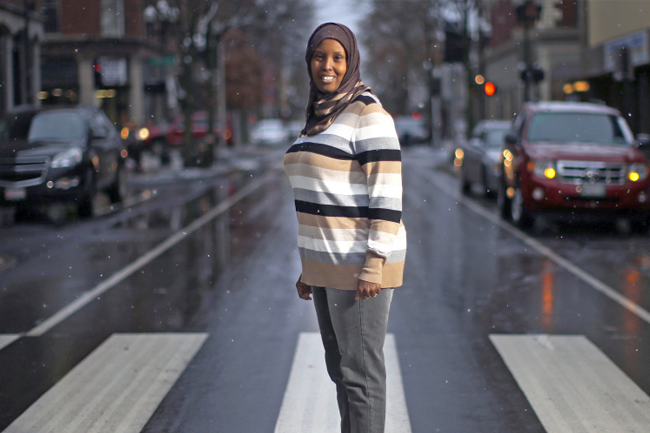A cup of coffee with ZamZam Mohamud at Forage Market in downtown Lewiston is liable to be an all-day affair.
Even before she sits down, she’s greeting Allen Smith, the owner of the cafe, one of many to open on Lisbon Street in recent years. On her way to a table, she passes someone else who offers a hug. Once seated, she waves at others who recognize her.
In a city of 36,000 people, including about 6,000 who have emigrated, mostly from Africa, since the late 1990s, it’s easy to blend in, but all Mohamud does is stand out.
The 41-year-old woman has become one of the most recognizable faces, not just of Lewiston’s sizable immigrant community, but of the entire city.
She has volunteered for just about every major institution in town: the library, the school department, the police department. She even served on the School Committee, the first African immigrant ever to do so.
If a newly settled refugee needs help navigating rental housing, they call Mohamud. If a school is facilitating a discussion on cultural diversity and inclusion, they call Mohamud. If police want to do outreach in a predominantly immigrant neighborhood, they call Mohamud.
Last October, library director Rick Speer was trying to put together an event at the library featuring a prominent Somali author. The author told him he’d do it if the library could be filled with Somalis. So Speer called Mohamud.
“I consider myself fortunate that when she first came to Lewiston, she thought so highly of the library,” Speer said.
But civic leaders said those are just the public things.
“I think what is most remarkable about Mohamud is all the little things she does that no one knows about,” said Phil Nadeau, Lewiston’s deputy city administrator, who met her shortly after she arrived two months after Sept. 11, 2001. “Not everyone is willing to take on that role of being a community leader but she does it with such grace.”
She was named after the Well of Zamzam in Mecca, which holds water blessed by God, according to Islamic history.
While she is originally from Somalia, Mohamud was living in a refugee camp in Kenya when she fled and came to the U.S. She doesn’t like to talk about that time. Still too much pain, even nearly two decades later.
“Why don’t we talk about happiness?” she said.
She arrived in this country with a husband from an arranged marriage and two young children, a boy and a girl. But things didn’t work out. She left her husband and moved to Maine, first to Portland where a friend had settled, then to Lewiston, where she could more easily afford housing. She got a job at Central Maine Medical Center on her second day, as a translator. She still works there, now as a nursing assistant.
She raised her children as a single parent. Her daughter, now 24, is a college graduate working in North Carolina. Her son, 23, is finishing school at the University of Southern Maine. They will both be home for Thanksgiving.
“Of course I celebrate Thanksgiving. I am an American,” she said. “But you know I’m thankful every day.”
At a time when the nation is polarized and people of Mohamud’s faith are nervous about what may come next for them, she is at peace.
“I look at the big picture,” she said. “We are all human beings.”
She will continue to be involved in her community. She can’t help it.
“I will not stay in the background,” Mohamud said.
Comments are not available on this story.
Send questions/comments to the editors.



